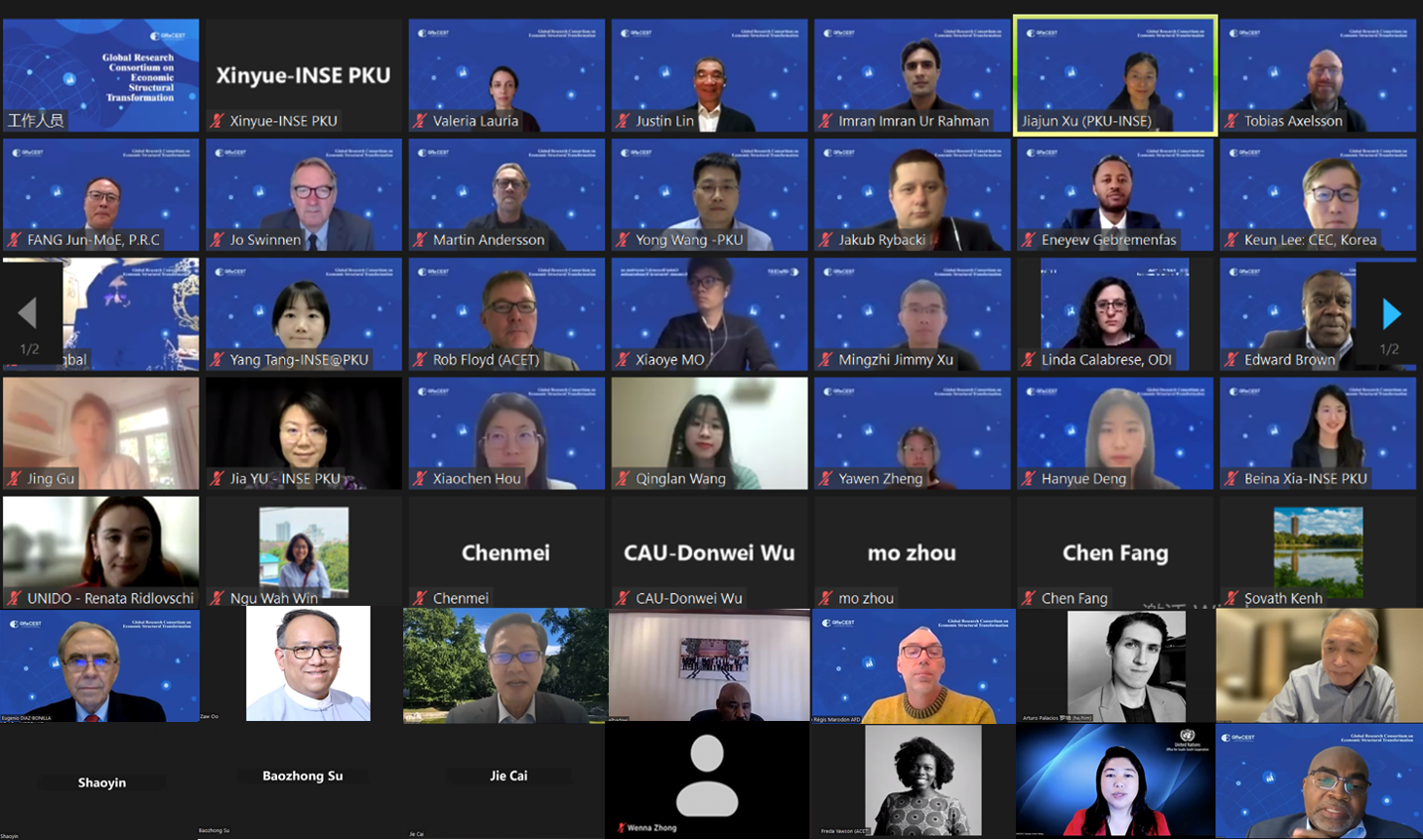INSE Hosted the Fourth Annual Conference of GReCEST
GReCEST Secretariat--INSE
2022-11-17
From the 14th to 16th of November 2022, the Institute of New Structural Economics at Peking University (INSE) hosted the fourth annual conference of the Global Research Consortium on Economic Structural Transformation (GReCEST). The conference brought together over 50 government officials, think tank leaders, scholars, and practitioners to address critical development issues facing developing countries regarding economic structural transformation.

Group Photo
During the conference opening ceremony, Justin Yifu LIN, Dean of the Institute of New Structural Economics and Chair of the GReCEST Steering Committee; Johan SWINNEN, Director General of International Food Policy Research Institute (IFPRI) and Vice-Chair of the GReCEST Steering Committee; Edward BROWN, Senior Director, Policy and Programs, African Center for Economic Transformation (ACET), on behalf of K.Y. AMOAKO, President of ACET and Vice-Chair of the GReCEST Steering Committee; Jun FANG, Deputy Director of Ministry of Education's Department of International Cooperation and Exchanges; Grace WANG, Deputy Director for Programme and Operations at the United Nations Office for South-South Cooperation (UNOSSC), acknowledged GReCEST’s vital mission of bridging academic research and policy practices, as well as contributing to the realization of the 2030 Sustainable Development Goals (SDGs) through structural transformation. This is particularly relevant in today's world which faces a number of challenges including the pandemic, climate change, food security, poverty escalation, deindustrialization, etc.
Following the opening remarks, a wide range of subthemes were addressed during the conference in three different sessions, including inclusive and sustainable industrialization, innovation and transformative change, and development financing. Scholars and experts presented their research and findings, sparkling lively discussions among the participants.
In session one, scholars presented their articles covering issues regarding the provision of infrastructure and a facilitating state as critical factors in explaining the heterogeneity in premature deindustrialization and structural change across developing countries, and the positive impacts of the implication of the New Structural Economics framework based on evidence from Sub-Saharan African economies. Moreover, the panelists also discussed the process of industrialization and FDI attraction under the role of special economic zones, industrial parks, and agro-food parks in Central Asian and African countries.
In session two, scholarly interventions addressed the identification of different types of regional innovation systems (RIS), which significantly explain the different economic growth rates of emerging economies compared to those in advanced economies. As part of the academic discussion, the panelists also discussed China's efforts to decarbonize through its state-owned enterprises and green industrial policies. Furthermore, the panel discussion also addressed the linkages between structural transformations and digitalization, the digital divide between countries with different income levels, and how technologies help achieve structural transformation, combat climate change, and preserve biodiversity.
During session three, the first global database on development financing institutions worldwide was presented to highlight a promising research agenda from the perspective of New Structural Economics, together with a research article examining the role of national development banks in structural transformation based on the case of BRICS countries. Meanwhile, the panel discussion covered the role of development financing in fostering structural transformation, including the catalytic role of development financing institutions on private capital, incubation of green bond markets, the design of a global financial solution to better serve developing countries, etc.
In the last session of the conference, an internal plenary session among GReCEST members was hosted by the GReCEST secretariat. Jiajun XU, Executive Deputy Dean of INSE and General Secretary of GReCEST, reviewed the activities and research organized by GReCEST in previous years. In addition, the participating members elected the steering committee members and put forward constructive suggestions for the future development of GReCEST. At the end of the plenary session, Justin Yifu LIN, Dean of INSE and Chair of the GReCEST Steering Committee, thanked the steering committee for their guidance, all members for their continued support to the GReCEST, and the secretariat for their endless efforts. LIN also expected all members to join hands in building the consortium, aiming to promote and facilitate developing countries to realize structural transformation in the future.
Initiated by the INSE at Peking University, with 36 members from across the globe, GReCEST serves as one of the priority areas under the umbrella of the Global Coalition of Southern Think Tank Networks, co-convened by the United Nations Development Program (UNDP) and the United Nations Office for South-South Cooperation (UNOSSC). GReCEST aspires to foster intellectual partnerships and promote original thinking and innovative practice in an effort to help developing countries to achieve economic structural transformation. This fourth annual conference has also received support from three renowned academic journals: World Development, Structural Change and Economic Dynamics, and Journal of Economic Policy Reform.